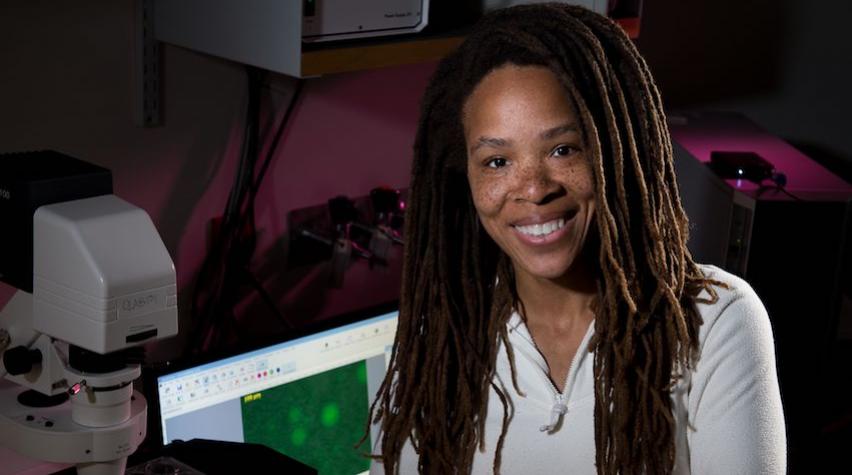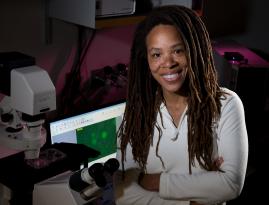
The AfroBiotech Conference highlights the achievements of African Americans in biotechnology. It aims to inspire a new generation of diverse biotechnology professionals, as well as identify, communicate, and explore current advancements in various aspects of biotechnology.
I spoke with Ronke about her inspiration, new developments in the field, and the upcoming AfroBiotech conference.
What inspired you to do research in your field?
I started off in aerospace engineering with a focus in structural mechanics and optimization. I would look at optimizing structures to support particular loads. I would use algorithms to minimize weight while ensuring the structure wouldn’t fail in buckling, bending, or fatigue. Then in one of my classes we were tasked to design a composite material for a non-aerospace application. I had no idea what to do, and in my search stumbled upon a hip implant that failed because of stress shielding. The bone had optimized itself around the implant, drastically reducing in thickness because the load it was accustomed to was being taken up by the implant.
The more I learned about bone, the more I fell in love with it. Here was this tissue that was better at optimization than every optimization program I had ever used. I became a biomedical engineer shortly after, and musculoskeletal tissues continue to inspire me.
Are there any new developments in the field you are particularly excited about?
Yes, single-cell RNA sequencing. One area of my research is cell therapy. I use certain populations of cells for the therapy and a different population are the target cells. These interact in complex ways. Single-cell RNA sequencing is a tool used to uncover transcriptome diversity in heterogeneous samples. I can use it to examine how my therapeutic cells are affecting the transcriptome of the target cells, and vice versa. Recent advances in microfluidics and molecular barcoding have made the transcriptional profiling of tens of thousands of individual cells rapid and easy to interpret.
What role do you see biomedical engineers having during the COVID-19 pandemic?
I've seen these wars between basic scientists and epidemiologists and infection prevention practitioners. The basic scientists note the ability of SARS-CoV-2 to be aerosolized and call for the classification of the virus to be airborne. And the practitioners note that the reproduction rate of true airborne diseases is in the teens. For instance, the reproduction number of tuberculosis is 1 infected individual can get 18 people sick, while the cold virus, influenza virus, and coronavirus, the reproduction number is 2 to 2.5.
Both the basic scientists and the infectious disease practitioners are trying to save lives. But the latter understand the operational consequences of labeling a disease airborne, including using airborne rooms and isolation rooms in hospitals in a way that may cost lives. If the disease is declared airborne, will hospitals have to shift and no longer take as many COVID-19 patients? Only as many as they have isolation rooms for?
There are currently COVID patients in hospitals nationwide without "airborne rooms," sharing ventilation and there is no transmission into other patients’ rooms, so their reluctance for this shift is understandable. As is the concern that the general population doesn't understand that not classifying a virus as airborne does not mean it cannot be borne in the air.
I think biomedical engineers can straddle this and find solutions to prevent transmission of the virus through the air, to develop cheaper and functional respirators quickly, to meet the needs of both the basic scientists and the practitioners.
What are you most excited about for the upcoming AfroBiotech conference?
There is a great quote by the Geena Davis Institute on Gender in Media: If she can't see it, she can't be it. I think many of our Black and Brown youth don't see us and don't imagine themselves as scientists and engineers. I'm excited to show them that we're here, and there are a lot of us.
What advice would you give to early career researchers during this time?
If you are an academic and your institution is offering a COVID-19 stop the clock, take it. You can always go up early if you weren't set back, but you can never get that time back later if you need it. Also, right now there are a lot of requests on our time.
Every single request, put it in a spreadsheet. Was it a request for a talk, a panel, a discussion? Was it for diversity and inclusion? Which did you accept? Which did you decline? Document the when, the where, the what. I saw this advice, and just started doing it. It is data, and it opens the eyes of our department to how many more requests of this nature we get than our white male colleagues do. And it can help in your packet.
The AfroBiotech Conference 2020 will be held virtually on October 26–28, 2020. Learn more and submit an abstract today.

Ronke Olabisi
Prof. Ronke Olabisi is an Assistant Professor and Samueli Development Chair in Biomedical Engineering at UC Irvine. Dr. Olabisi’s research interests encompass biomechanics, biomaterials, tissue engineering, and regenerative medicine to repair or generate tissues. Specifically, her approach is through developing biosynthetic materials, which combine the best aspects of synthetic and biological materials and can control cell and tissue function. Read more.



Comments
Amazing transition from aeronautical to biomedical engineering..Great job.